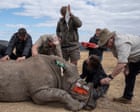
In various parts of the world, innovative projects and developments are addressing environmental conservation, climate challenges, and advances in healthcare infrastructure. These initiatives aim to create a safer and more sustainable future, bringing hope and practical solutions to some of today’s most pressing issues.
In South Africa, a groundbreaking project seeks to combat the illegal poaching of rhinos—a critical threat to wildlife conservation. The Rhisotope Project, a collaborative effort involving the University of the Witwatersrand, conservationists, and nuclear energy experts, is working to inject rhino horns with radioactive isotopes. These isotopes, undetectable to the naked eye and harmless to the rhinos, can be traced at international borders and airports. This innovative approach aims to deter traffickers, enhancing the protection of this endangered species. Following a successful trial involving five rhinos, the project envisions scaling up to cover a larger portion of the rhino population, marking an important step toward securing the survival of these majestic animals.
Across the African continent, residents around Lake Chad face dual challenges—rising water levels and the threat of Boko Haram. Contrary to longstanding perceptions, the lake is not shrinking but expanding, driven by climate change’s dynamic impacts. This transformation has significant implications for the agricultural viability and daily lives of the local communities, who are already struggling with the presence of militant activities. In response, residents are organizing efforts to better manage and adapt agricultural spaces, preparing for a future that mitigates environmental risks while enhancing local resilience. These efforts underscore the importance of adaptive strategies in face of climate change, bringing collective and thoughtful action to support vulnerable populations.
In a separate yet equally important realm of progress, the Madeira region in Portugal is experiencing a positive shift in its healthcare system. The number of medical professionals, including doctors and nurses, has seen a notable increase within the last year. This growth not only boosts healthcare capacity but also reflects a broader trend of improving public health infrastructure. With 1,420 doctors registered with the Ordem dos Médicos in 2024, approximately 69.9% are residing in Funchal, the capital. The enhanced resource pool is set to elevate the quality of healthcare services available to the region’s residents, signaling an encouraging advancement for the community’s overall well-being.
These snapshots of innovative and heartening developments from different corners of the globe illustrate a quiet yet profound commitment to addressing the challenges facing our planet. Whether it’s through cutting-edge scientific interventions to protect endangered wildlife, adaptive measures against environmental upheavals, or strengthening healthcare frameworks, there is much to be hopeful about. Such efforts reflect the power of collaboration, innovation, and compassionate action in creating a more balanced and caring world.
Source: {link}
